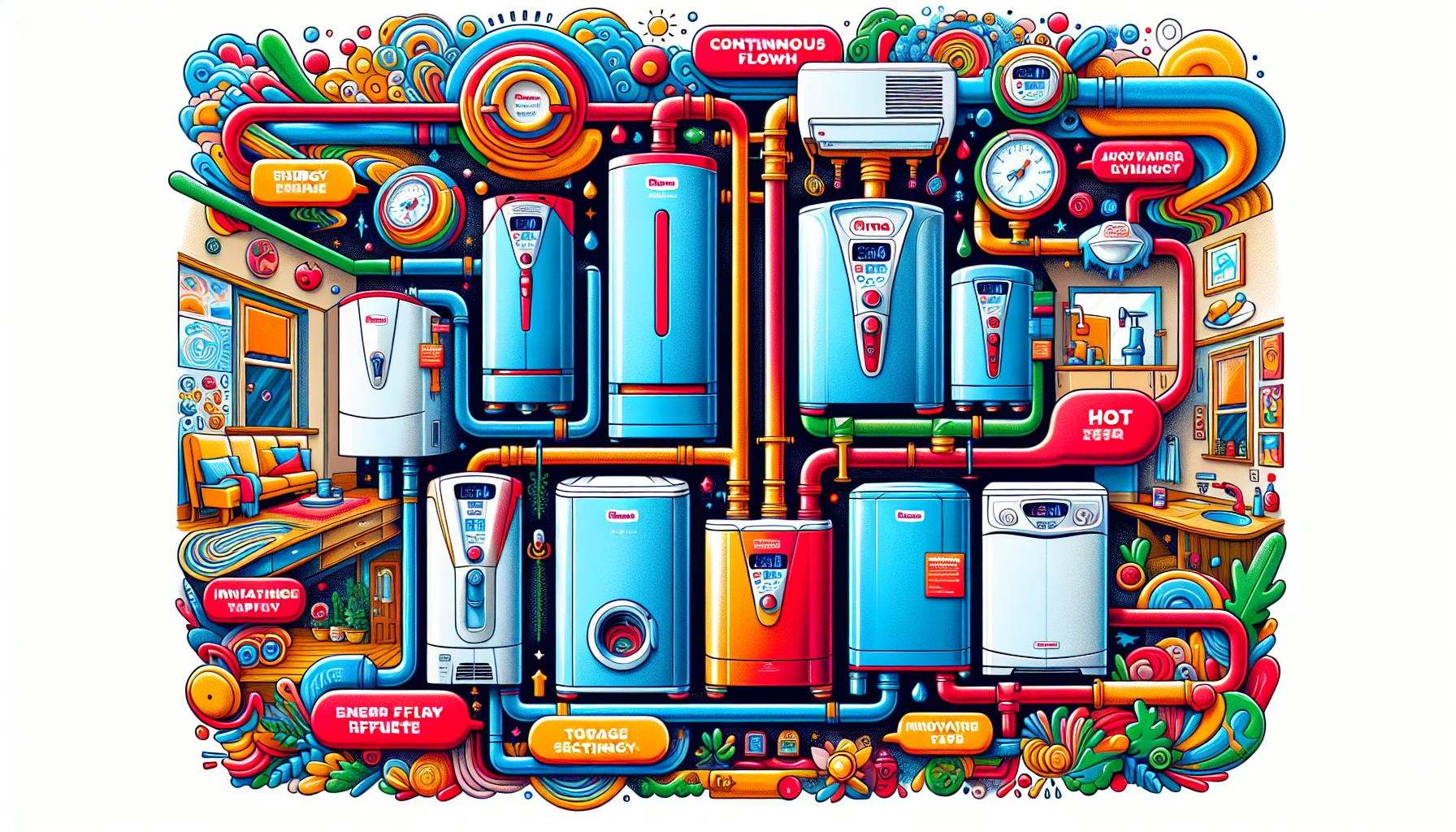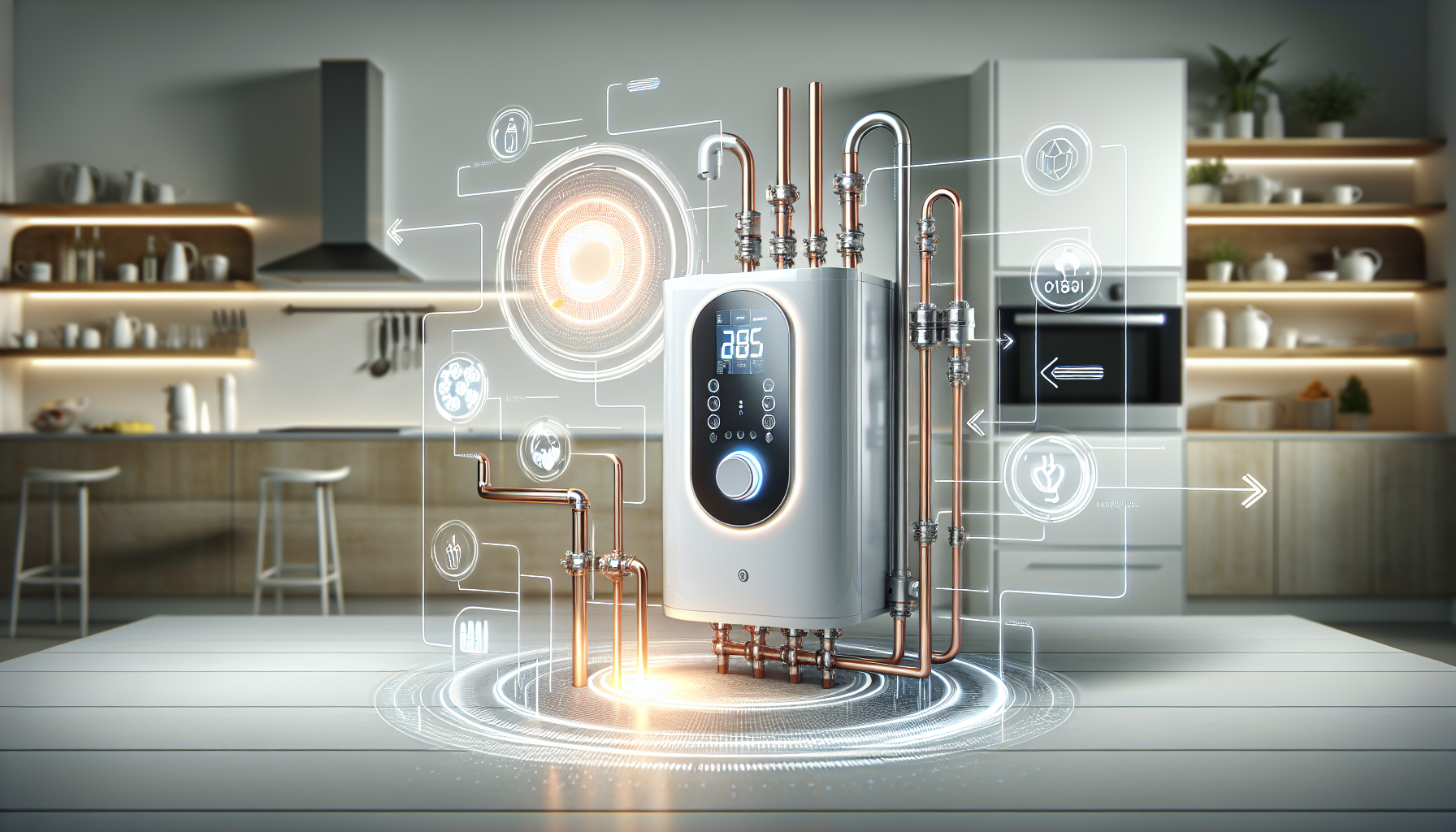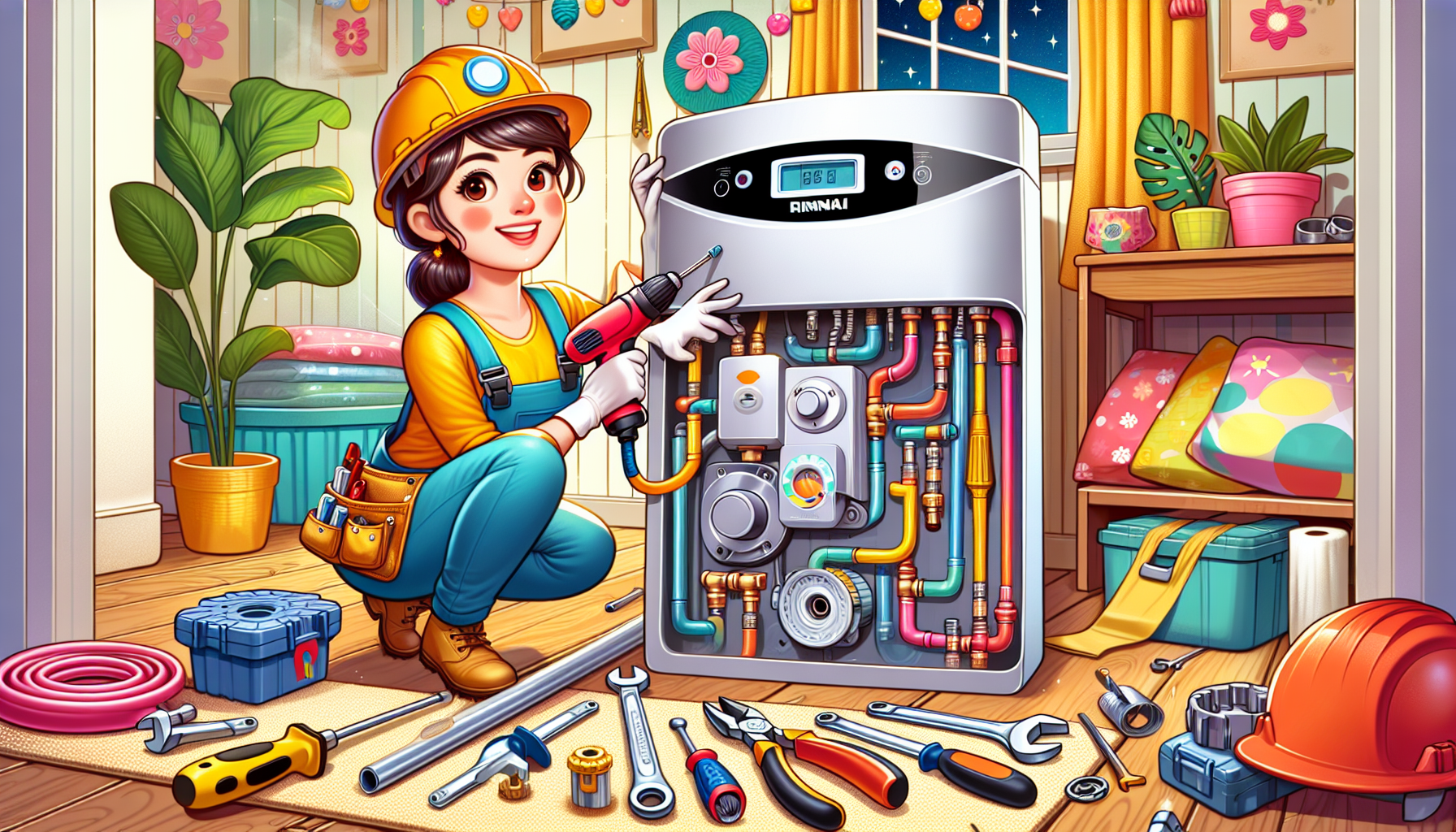Top-Quality Hot Water System Rinnai: Best Prices & Installation
Looking for a top-quality and efficient hot water system? Rinnai offers excellent options renowned for their reliability and energy savings. This article will guide you through the different Rinnai hot water systems, their features, installation tips, and costs to help you choose the best one for your home.
Key Takeaways
-
Rinnai offers a diverse range of energy-efficient hot water systems, including Continuous Flow, Electric Storage, Gas Storage, and Heat Pump models, catering to various household needs.
-
Advanced features such as Puretemp™ temperature control and tankless technology enhance the safety, efficiency, and environmental sustainability of Rinnai hot water systems.
-
Proper installation by licensed professionals and regular maintenance are crucial for maximizing the performance and longevity of Rinnai hot water systems.
Exploring Rinnai Hot Water Systems

Rinnai hot water systems are celebrated for their reliability and high energy efficiency, making them a popular choice among Australian households. These systems provide a dependable supply of hot water while reducing energy costs, ensuring that your home is always comfortable and efficient.
Rinnai provides various hot water solutions to meet diverse requirements. Their offerings include Continuous Flow, Electric Storage, Gas Storage, and Heat Pump systems. Each type of system is designed with specific benefits to cater to various household requirements, ensuring that there’s a perfect Rinnai hot water system for every home.
Continuous Flow Hot Water Systems
Rinnai’s continuous flow hot water systems, also known as tankless or on-demand systems, provide an endless supply of hot water by heating water only when needed. This innovative approach significantly reduces energy consumption compared to traditional systems that constantly heat water, making these systems highly energy efficient.
With advanced temperature controls and flame failure detection, Rinnai continuous flow systems ensure user safety and comfort. Their compact design allows for versatile installation options, making them ideal for homes with limited space.
The Rinnai Infinity series is particularly renowned for its high efficiency and reliability, providing a seamless hot water experience for households of all sizes.
Electric Storage Hot Water Systems
Electric storage hot water systems from Rinnai are designed to meet the needs of various households by offering different capacities and energy-efficient options. These systems are an affordable choice, especially in regions where electricity is more cost-effective than gas and government rebates are available.
The simplicity of installation and operation makes electric storage systems a popular choice, as most homes already have the necessary 240-volt connection. Rinnai’s electric water heaters come in compact sizes, making them suitable for tight installation spaces.
ENERGY STAR® certified models can reduce energy usage by up to 40% compared to standard units, offering energy-efficient solutions.
Gas Storage Hot Water Systems
Rinnai gas storage hot water systems are ideal for larger households that require a consistent supply of hot water across multiple outlets. Models like the Rinnai B20N50 come in various sizes, including 16 – 26 litre units, ensuring that there is a suitable option for different household demands.
These systems are designed to operate efficiently even with low flow rates, making them compatible with low-flow shower heads and other water-saving fixtures. The reliability and efficiency of Rinnai gas storage systems make them a perfect fit for homes that need ample hot water without compromising on energy efficiency.
Heat Pump Hot Water Systems
Rinnai’s heat pump hot water systems offer an environmentally friendly option that significantly reduces energy costs. These systems are designed to operate efficiently in diverse Australian climates, making them a versatile choice for homeowners across the country. Heat pump systems can save up to 65% on energy costs compared to traditional electric systems by using ambient air to heat water.
Additionally, Rinnai heat pump systems are built to withstand tough environmental conditions, ensuring long-lasting performance and durability. Their space-saving design makes them suitable for various installation scenarios, providing both efficiency and convenience.
Advanced Features of Rinnai Hot Water Systems

Rinnai hot water systems are packed with advanced features that enhance their performance, reliability, and efficiency. These features make Rinnai a leading choice for Australian homes, offering solutions that conserve water and reduce energy consumption. Key advanced features include precise temperature control, exceptional energy efficiency, and innovative design elements.
The subsections below will delve into these features in more detail, highlighting how they contribute to the superior performance of Rinnai hot water systems.
Temperature Control Technology
Rinnai hot water systems utilize Puretemp™ temperature stability technology to ensure precise regulation of water temperature. This advanced technology maintains stable water temperatures, providing comfort and reliability for users. The precise control of water temperature not only enhances user comfort but also contributes to safety by preventing scalding with the use of a tempering valve.
Additionally, Rinnai systems emphasize water conservation through features that allow users to monitor and control their water usage effectively, promoting both energy efficiency and environmental responsibility.
Energy Efficiency
Energy efficiency is a hallmark of Rinnai hot water systems, designed to reduce running costs and emissions while providing reliable hot water. The use of advanced technology in Rinnai systems results in lower energy usage, contributing to fewer greenhouse gas emissions.
Tankless technology in Rinnai water heaters heats water only as needed, significantly decreasing energy consumption and associated emissions. For instance, the Rinnai Enviroflo Heat Pump can save up to 65% energy compared to traditional electric hot water systems by utilizing ambient air for heating.
Models like the Rinnai Infinity 20, with a 6-star energy rating, exemplify superior energy efficiency, making them an excellent choice for eco-conscious homeowners.
Innovative Design
Rinnai hot water systems are renowned for their innovative and compact designs, which allow for flexible installation options in various home spaces. Manufactured in a high-tech facility, these systems illustrate quality Japanese design and exceptional durability, ensuring reliable performance over time.
The compact design of Rinnai units means they can be easily installed in limited spaces, such as closets or under sinks, without compromising on efficiency or aesthetic appeal. This flexibility makes Rinnai systems an ideal choice for both new constructions and existing homes looking to upgrade their hot water solutions.
Installation and Maintenance of Rinnai Hot Water Systems

Proper installation and regular maintenance are crucial for the optimal performance and longevity of Rinnai hot water systems. Professional installation by licensed experts ensures that the system operates safely and efficiently, adhering to strict Australian plumbing and electrical standards.
Regular maintenance, including annual checks and servicing, helps keep the system running smoothly, preventing costly repairs and enhancing its lifespan. The following subsections will delve into the importance of professional installation and the benefits of regular maintenance.
Professional Installation
Licensed professionals should install your Rinnai hot water system to ensure safety and efficiency. Expert installation guarantees adherence to strict Australian plumbing and electrical standards, reducing the risks of leaks, electrical hazards, and gas leaks. Hiring professionals guarantees correct setup, providing peace of mind and optimal performance from day one.
Moreover, professional installation often includes a labour warranty, adding an extra layer of security for homeowners.
Regular Maintenance
Regular maintenance is vital for prolonging the lifespan and efficiency of Rinnai hot water systems. It is recommended to service these systems every two years to prevent expensive repairs and ensure optimal operation. An annual professional check-up can help identify and address potential issues before they become major problems, enhancing the system’s performance and reliability.
Regular upkeep not only ensures efficient functioning but also contributes to energy savings and water conservation, making it a smart investment for homeowners.
Comparing Rinnai Hot Water System Prices

Understanding the price range of different Rinnai hot water systems is essential for making an informed purchasing decision. Rinnai offers a variety of models with different features and specifications, catering to various budgets and household needs. Balancing initial costs with long-term savings from energy-efficient models helps homeowners choose the best system for their needs.
The following subsections will provide detailed price ranges for continuous flow, electric storage, and gas storage systems, helping you find the most competitive prices for your hot water needs.
Price Range for Continuous Flow Systems
Rinnai continuous flow hot water systems are available in a price range that suits various budgets, typically costing between $970 and $2,130. The price variation depends on the model and its specifications, with more advanced features and higher capacities generally costing more.
These systems offer excellent value for money, providing continuous hot water and high energy efficiency at competitive prices. Homeowners can choose from an extensive range of models to find the perfect fit for their needs and budget.
Price Range for Electric Storage Systems
Rinnai electric storage hot water systems are designed to cater to a variety of household needs and preferences, with prices ranging from $450 to $2,000. These systems offer affordable options for those looking for reliable hot water solutions without breaking the bank.
The variety of models available ensures that there is a suitable option for every household, whether you need a compact unit for tight spaces or a larger system for higher hot water demands.
Price Range for Gas Storage Systems
The cost of Rinnai gas storage hot water systems varies based on the model and specifications, with popular choices like the Rinnai B20N50 featuring a 6-star energy efficiency rating and a 15-year warranty on the Heat Exchanger. These systems are designed to provide reliable and efficient hot water solutions for larger households, ensuring ample supply across multiple outlets.
The price range for these systems reflects their advanced features and high efficiency, making them a valuable investment for homes with higher hot water needs.
Environmental Impact and Sustainability

Rinnai’s commitment to environmental sustainability is evident in the design and performance of their hot water systems. These systems are engineered to be energy efficient and reduce greenhouse gas emissions, making them a responsible choice for eco-conscious households. By heating water only when needed, Rinnai systems minimize energy usage and contribute to lower emissions.
The following subsections will explore how Rinnai systems help reduce greenhouse gas emissions and promote water conservation, highlighting their role in creating a more sustainable future.
Reducing Greenhouse Gas Emissions
Reducing greenhouse gas emissions is crucial for combating climate change, and Rinnai hot water systems are designed with this goal in mind. Electric models that use renewable energy sources are particularly beneficial for the environment, as they generate fewer emissions compared to gas systems that rely on fossil fuels.
Rinnai’s advanced technology enhances energy efficiency, further reducing the environmental impact of their systems. Choosing a Rinnai hot water system ensures reliable hot water and contributes to a greener planet.
Water Conservation
Water conservation is another key aspect of Rinnai’s sustainable design. These systems are engineered to minimize water wastage through innovative technologies. Features like the ECO Mode allow users to manage water flow rates efficiently, ensuring that water is used effectively without unnecessary waste.
Rinnai systems help preserve water through better conservation practices, making them an excellent choice for environmentally conscious homeowners.
Choosing the Right Rinnai Hot Water System for Your Home
Selecting the right Rinnai hot water system for your home involves careful consideration of several factors, including household size, daily hot water usage, energy source availability, and budget constraints. Understanding these factors will help you make an informed decision that meets your specific needs and ensures optimal performance.
The following subsections will guide you through these considerations, helping you choose the perfect Rinnai system for your home.
Household Size and Hot Water Usage
The capacity of your hot water system should align with the number of residents and their daily hot water consumption. A Rinnai 125L model suits medium-sized families, providing sufficient hot water for approximately 3-4 individuals. As a general guideline, allocate about 50 liters of hot water per person per day, with some additional capacity to meet higher demands.
Choosing the right system capacity ensures that your daily hot water needs are adequately met without running out of hot water.
Energy Source Availability
The availability of natural gas or electricity in your home significantly influences the type of Rinnai hot water system you can install. If your home has access to natural gas, a gas storage or continuous flow system may be the best choice due to their efficiency and cost-effectiveness.
Conversely, if electricity is more readily available or cost-effective, an electric storage or heat pump system could be the ideal solution. Considering the energy sources available will help you choose a system that fits your home’s infrastructure and energy usage patterns.
Budget Considerations
When selecting a Rinnai hot water system, it’s essential to balance the system’s features and benefits against your budget. Rinnai continuous flow systems typically range in price, providing options that suit various budgets. Electric storage systems are also competitively priced, making them accessible for a wide range of consumers.
For larger households, gas storage systems offer an economical choice, providing value while meeting higher hot water demands. By considering your budget and the long-term savings from energy-efficient models, you can make a well-informed decision that fits your financial plan.
Summary
In conclusion, Rinnai hot water systems offer a range of reliable, energy-efficient, and environmentally friendly solutions to meet the diverse needs of Australian households. Whether you opt for a continuous flow, electric storage, gas storage, or heat pump system, Rinnai provides options that balance performance, sustainability, and cost-effectiveness. By understanding the advanced features, appropriate installation and maintenance practices, and making informed choices based on your household’s specific needs, you can enjoy a consistent and efficient hot water supply. Choose Rinnai for a future-proof hot water solution that supports both your comfort and the environment.
Frequently Asked Questions
What are the benefits of insulating hot water pipes?
Insulating hot water pipes effectively reduces heat loss, minimizing energy waste and improving efficiency, particularly in long pipe runs. This not only saves on energy costs but also helps deliver hot water faster.
What are the advantages of electric tank water heaters compared to gas models?
Electric tank water heaters offer easier installation and operation compared to gas models, as most homes are equipped with the required 240-volt connection. This makes them a convenient choice for homeowners.
What is a notable feature of ENERGY STAR® certified electric hot water models?
A notable feature of ENERGY STAR® certified electric hot water models is that they use up to 40% less energy than standard units, making them a more efficient and environmentally friendly choice.
What is a benefit of electric hot water systems in regions with government rebates?
Electric hot water systems offer significant affordability in regions with government rebates, making them an economical choice compared to gas systems. This can lead to substantial savings on energy costs for consumers.
What should be considered when selecting an electric storage hot water system?
When selecting an electric storage hot water system, consider capacity, energy efficiency, tank type, installation requirements, maintenance, and the brand's reputation. These factors ensure you choose a reliable and efficient system for your needs.

























